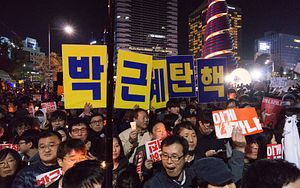Park Geun-hye’s presidency remains on life support as momentum gathers to impeach the South Korean leader over her ties to a shadowy adviser whose father ran a religious cult.
The People’s Party, the third-largest political grouping, on Monday said it would begin gathering signatures in parliament for an impeachment motion, while the larger opposition Democratic Party announced it was considering supporting Park’s removal from office.
The moves come after a bombshell claim by prosecutors that Park was a “conspirator” in her unofficial adviser Choi Soon-sil’s extortion of large companies for donations to a private foundation, which allegedly doubled as a personal slush fund. Choi, whose father was a mentor to the president after her parents were assassinated, and two presidential aides have already been charged over the scandal, which also involves Choi’s access to classified information despite having no security clearance. Park, whose tenure runs out in early 2018, is immune from prosecution while she remains in office.
The two main opposition parties together take up 159 seats in the 300-member National Assembly, well shy of the two-thirds majority required to pass an impeachment motion. Park, however, can hardly count on her own Saenuri Party, which has 127 seats, for support. Kim Moo-sung, a former Saenuri Party leader who now leads a faction critical of Park, has publicly backed impeachment, raising the possibility that a critical mass of conservative lawmakers could cross the aisle to demand the president’s ouster.
If the National Assembly were to agree on impeachment, Park’s fate would be placed in the hands of the Constitutional Court, where six out of nine judges would have to confirm her removal from office. With up to one million South Koreans taking to the streets in recent demonstrations calling for the president’s resignation, Park has apologized twice but so far refused to step down.
Despite tasting blood as the president’s approval rating languishes at an abysmal five percent, opposition politicians have been hesitant to attempt impeachment in light of recent history. Conservative lawmakers voted to impeach liberal President Roh Moo-hyun only to see the Constitutional Court rule in favor of the human rights lawyer-turned-politician. The general public, sensing rank political opportunism by the president’s critics, rewarded Roh’s Uri Party with a majority of seats at the next parliamentary election in 2004.
Nam Chang-hee, a social sciences professor at Inha University in Incheon, said there was a strong possibility of members of Park’s own party sealing her fate as rumors that have run wild in the media became substantiated.
“In the meantime, should Pyongyang detonate another nuclear device or attempt to exploit the political turmoil in Seoul through military provocation, ‘shy’ conservatives will return to Park’s side, demanding social order and political normalcy for crisis management,” he said.
Bang Seung-ju, a constitutional law professor at Hanyang University in Seoul, agreed that conservatives could end up abandoning the president in large numbers.
“The opposition parties don’t reach the two-thirds majority of the National Assembly, so it will be difficult … to impeach through their efforts alone,” Bang explained. “But because representative Kim Moo-sung, who leads a fringe faction of the ruling party, has come out in favor of impeachment as well, I think the chance of impeachment is high if ruling party representatives get on board.”
In that case, Park would still have a card to play in her favor: appointing the next president of the Constitutional Court after current chief Park Han-Chul steps down in February. Park’s pick, which would require parliamentary consent, could have a major impact on an impeachment decision, which does not appear likely within the current chief justice’s term.
“We will have to wait and see if the new Constitutional Court led by President Park Geun-hye’s next appointee or a court lacking one justice would confirm her impeachment,” said Bang.

































